#back which is very much a tactic by Carroll to make sure it isn’t too scary
Text
Anytime someone says that darker retellings of Alice are actually more accurate to the books then the more colorful ones, I’m convinced that they’ve never read the books in their entire lives
They just saw the realistic illustrations and went “Oh my god this is too spooky ☹️” like be so real
#anytime I see someone claimed disney sanitized the books I seethe#example: in the books the queen likes to order beheadings BUT it’s noted that nobody actually dies because the king orders it off behind her#back which is very much a tactic by Carroll to make sure it isn’t too scary#Disney on the other hand just straight up say that yeah everyone she orders to behead dies straight up#the king isn’t there to reassure the audience that They don’t actually die I just order off the order#NO the king in that movie is in full support of his wife’s tyrannical ways#this is specifically a message to a lot McGee Alice fans#it’s always the people who are a fan of those games that say this kind of shit and it’s really annoying#alice in wonderland#javi rambles
66 notes
·
View notes
Photo
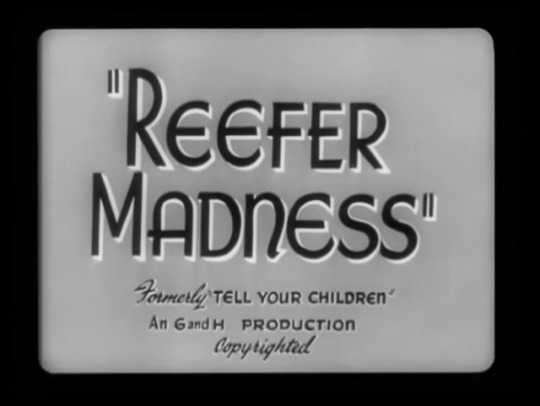
Reefer Madness
The first time I saw this movie was on a colourized DVD release with special features, one of which was a commentary. How exactly do you do a DVD commentary on a movie made in 1936? Everybody involved in making it is now either senile or dead! Well, if you already know that everyone watching your movie will be doing so ironically (and probably baked like potatoes), you hire Mike Nelson. Yes ladies and gentlemen, this the only movie I have ever encountered where the Rifftrack is actually on the official DVD.
Even without that, though, Reefer Madness would be a serious MST3K candidate. It's full of curiously old teenagers and flamboyant overacting, and is as ridiculous in its condemnation of marijuana as The Sinister Urge was in its insistence that pornography is the worst of all crimes. It's also widely considered One Of The Worst Movies Ever, an honour it shares with MST3K features like Manos: the Hands of Fate and The Incredibly Strange Creatures who Stopped Living and became Mixed-Up Zombies. If you can't find the version with Mike's commentary, it's easy to riff it yourself. Light up and pass the doritos, and let’s watch.
Reefer Madness begins with multiple forms of exposition. First there's a dull opening crawl about the evils of 'marihuana' (Mike helpfully tells us that this was before the invention of the letter J). Then there's a series of fake newspaper headlines about the 'war on dope', which flash by too quickly for me to see if there are any new petitions against tax (there are photos showing horses). Then we go to a special PTA meeting, where high school principal Dr. Alfred Carroll is expounding on the need to make laws and educate our children about drugs. He promises us a lurid tale of what this horrible substance will drive our children to do.
Then the story finally starts, and we get some characters. We meet May and Jack, a couple who sell pot out of their apartment – May doesn't like her beau's practice of selling drugs to 'young kids', which he does by singling them out at the local malt shop and inviting them to ‘parties’ – once they get there, they are offered joints in place of cigarettes, and bam! Instant addicton and g-rated debauchery for everyone! Laughter! Singing! Dancing! Kissing! Good god, man, it's as if these people are having a good time! Dilbert's boss is the malt shop's piano player for some reason.
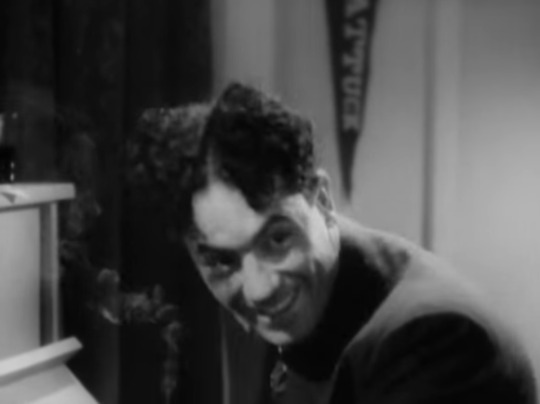
So much for our villains. Our protagonists are Billy and Mary, who I believe are supposed to be about fifteen or sixteen years old. Do I need to mention that they're played by twenty-five-year-old actors? I didn't think so. They drink hot chocolate while studying together, flirt by reading Shakespeare, and use the word 'swell' a lot. I think the movie wants us to feel that they're nice young folks with their whole lives ahead of them. I find myself looking eagerly forward to seeing horrible things happen to them. Sure enough, first Mary’s brother, Jimmy, and then Billy himself are snared by May and Jack, and proceed to descend into drug-fueled madness!
Almost everybody who so much as touches pot in this movie comes to a horrible end. Mary, worried about her brother and boyfriend, happens across the place and is given a joint. She didn’t even know what it was, but as soon as it starts taking effect the man who gave it to her tries to rape her. Moments later, Billy blunders in and sees, and in the ensuing fight Mary gets shot and killed. Bill is blamed and is sentenced to hanging. The guy who tried to rape Mary goes insane and beats Jack to death. May confesses everything to the cops and then, consumed by remorse, jumps out a window to her death. The would-be rapist is thrown in the nuthouse for the rest of his life, while Billy and Jimmy will have to live with the knowledge that they are at least tangentially responsible for Mary's murder. This is supposed to be a sequence of horrific tragedy upon horrific tragedy, but it's all so histrionic that the audience cannot help but laugh.
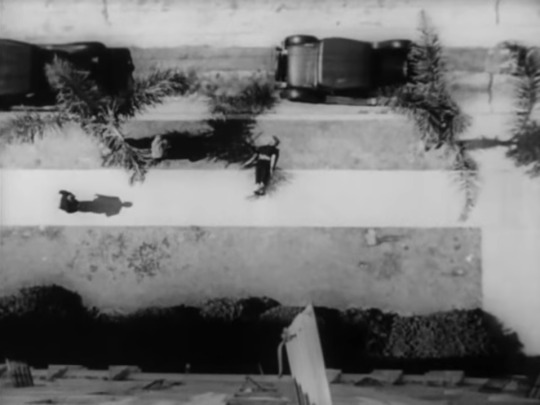
Then finally we're back with Dr. Carroll, as he grimly informs us that we must spread the truth about ‘marihuana’ or such tragedies are doomed to happen again. The movie wants to hold Dr. Carroll up as a crusader for good, but from the point of view of somebody watching while not stoned he comes across as a paranoid asshole. This whole story of awful things happening because of drugs is him talking, remember, so when we recognize that what he's saying is absurd, we have to assume that it's him exaggerating in order to scare the shit out of his audience of concerned parents.
Then there's the way he treats his students. At one point in Billy's spiral into addiction, Carroll calls him into his office for a word. There, he tells him he's going to ask him a straightforward question, and then he says “isn't it true that you have, perhaps unwillingly, acquired a certain harmful habit through association with certain undesirable people?” That's a straightforward question? I can barely parse that and I'm stone-cold sober! He adds, “if you ever want to confide in me, no-one will ever be the wiser.” Remember, we're supposedly hearing this sordid story as he tells it to the entire PTA. I'm betting no student ever told him anything ever again.
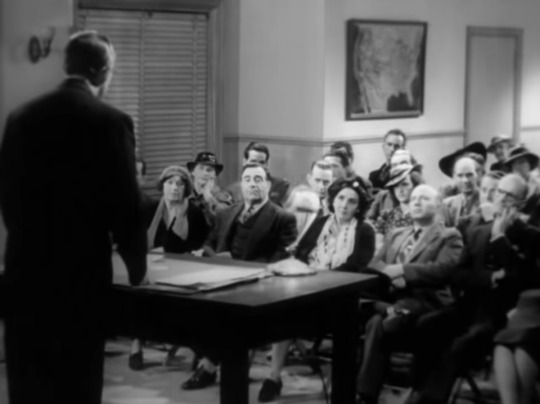
Another scare tactic used in the movie is much more subtle than the overblown exaggeration. In the real world kids who try drugs usually do so either out of curiosity or a desire to fit in, but Billy and Mary are both tricked into their first joint. This tells the viewer that no matter how sweet and well-behaved their kids are, they're still vulnerable to pushers. Mary and Billy are each offered a cigarette they are told is ordinary tobacco, which is actually both funny and deeply repugnant given the movie's emphasis on what good kids they are. How dare those evil dealers take something as pure and wholesome as smoking and turn it into a tool of moral degredation!
The two 'first joint' scenes also demonstrate quite efficiently that nobody involved in the making of this movie had ever been anywhere near marijuana. If they had, they would have known that it smells totally different from tobacco... or maybe they wouldn't, because they'd all been smoking cigarettes since they were fourteen and their senses of smell were long extinguished. It's actually rather uncomfortable how a film that insists marijuana is 'the real public enemy number one!' shows its teenage characters smoking tobacco as if it's the most normal thing in the world. I asked my grandfather if fifteen-year-olds really smoked back then, and he said they smoked just as much as they could afford to. How does this species survive?!
Equally hilarious and horrifying is how Reefer Madness places such an emphasis on the ideas of 'truth' and 'education' when it is itself such a fountain of bullshit. I've only ever smoked pot once (it put me right to sleep), but even I can tell that Reefer Madness engages in some truly staggering hyperbole. According to Wikipedia, the side-effects of marijuana include dry mouth, red or itchy eyes, paranoia, and a decrease in short-term memory – but none of the twitchy, violent behaviour depicted in this movie. The stoners I've hung out with are usually too busy snacking their way through philosophical conversations to go out and commit violent crimes – yet here we're shown manslaughter and attempted rape, and are told about (though not shown) a boy murdering his entire family with an axe!
The movie goes to some trouble to show how one person's drug use affects an entire family, but of course it takes it to melodramatic extremes. It's Mary's concern for her brother Jimmy that leads her to the pot den, where she is accidentally shot in a struggle. Her parents have to deal with losing one child to drugs and the other to murder, while Billy's parents have to watch their son confess to a crime and be sentenced to hang. Your children's drug use won't just ruin their lives, it'll make you look bad in front of the neighbours!
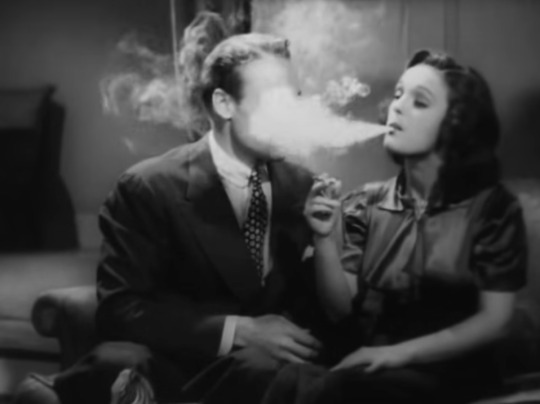
All this is very bombastic and silly, but there is exactly one good point buried in it. Education is important, and is the best way to combat social problems like drugs. When people know how something works, they're less likely to do it in dangerous ways. Consider sex education: studies suggest that kids who've had comprehensive sex ed actually have less sex than the ones who've been told the devil lurks in a vagina. They certainly have fewer unplanned pregnancies and STDs. Sex is not a forbidden fruit to them, so they're less curious about it, and when they do it, they know how to do it safely. The same is true of marijuana: people who know how to use it responsibly will, whereas those who only know it's a Naughty Thing will just blunder through it and make mistakes.
That's not what Reefer Madness has in mind, though. The movie has every intention of shouting its lies and exaggerations from the rooftops to scare people off ever trying marijuana in the first place. In the real world, this will always be counterproductive, because those who have actually used the drug know perfectly well it's not that bad. Sure enough, by 1938 the supposedly-educational film Tell Your Children had been re-titled Reefer Madness and was playing in grindhouses rather than PTA meetings, having already become a joke. A camp classic is the only type of classic this could ever have been.
23 notes
·
View notes
Text
Parents of Addicted Children
If you’re a parent the last thing you want is for your child to become addicted to drugs.
Sadly millions of American children fall victim to addiction every year. Parents find them selves battling drugs in their neighborhoods, schools and sometimes their homes. As a good parent we try to do all that we can to make sure our children don’t do drugs. Yet try as we may sometimes even the best of kids wind up on drugs.
What then? What does a mom or dad do once they discover that their child is a drug addict? Unfortunately for most family members who have a loved one on drugs; they become victims too. When faced with that fact that you have a child on drugs, many parents find themselves asking where did I go wrong?
As devastating as all this might seem you the parent can choose to be the victim or the champion in this situation. Either way you first have to look at the situation for what it truly is, don’t ignore obvious signs or downplay the problem. Know what to look for and take the appropriate action. If you miss the signs or refuse to confront the problem head on you could become an enabler and promote the drug problem rather help to end it.
Know the signs:
1. Change in appearance (dirty or wrinkled clothes, he or she no longer bathes; hair skin and teeth are neglected).
2. Sharp drop in grades
3. Violent outburst
4. Change in vocabulary (Begins using street slang and/or wearing gang colors, using gang style hand signs).
5. Unexplained weight loss
6. Change in friends (brings the thuglets home with him or her).
7. Becomes reclusive, (spends all day in his or her room, doesn’t eat with the family or participate in family time).
8. Lying, (about their behavior or whereabouts or simply lying when they don’t have to).
9. Missing valuables
10. Possessing unexplained valuables
11. Lethargy, slurred speech,
12. Change in sleeping, and or eating habits (staying up for days with little or no sleep, going on eating binges or not eating for days).
13. Skipping school or not showing up for work, losing job for tardiness or absenteeism.
14. Marked irresponsible behavior, if your child is mature and perhaps a parent themselves ( not paying rent or utilities, being evicted or services be disconnected for non payment, grand children being left alone or neglected).
15. Extreme paranoia
16. Lesions on the skin, blisters, persistent mouth sores, dark circles under the eyes. (Crystal Meth)
17. Prolonged use of eye drops or persistent eye irritation
18. Disobedient to parents and teachers
19. Apathy
20. Disregarding Consequences
The above list is not a conclusive list there are many other signs, and they will vary with the individual. Remember, early intervention is the key. Most parents are unaware their children are using drugs for sometimes years. By this time the addiction has such a hold on the child that it takes years to help them get free of the addiction.
Suspicions Confirmed:
Once you are sure that he or she is using drugs and /or alcohol you must take action to help them. It is important for you the parent to understand that when a person is suffering from addiction the only thing important to them is that next drink or fix. They are not concerned with the consequences of their actions. Therefore threats and/or ultimatums won’t faze him or her.
Before you can adequately help him or her, parents must first know what they are dealing with. If at all possible find out what type of drug that he or she is taking and then learn as much about the drug and its effects on the person. Parents should pay particular attention to the withdrawal symptoms and gestation time it stays in a persons system. This will aide parents in dealing with their child during the recovery process.
Proceed with caution! Parents must understand that this is not your little boy or girl that you are dealing with; this is a person under the influence of a mind altering drug. As was stated earlier a person suffering from addictions only concern is their next high. With this in mind he or she will cheat, lie, steal and possibly even kill to get that high. Never put yourself and/or other family members in harms way when attempting to confront a person about an addiction.
The Confrontation:
When you are ready to confront your child about his or her problem it is important to choose your battle. Pick the time you want to discuss this problem, even if you catch him or her in the act don’t allow the situation to control you, you control the situation. If you catch he or she in the act and you lose your temper react instead of act it could cripple your effort to help the addicted person.
Pick a time and a place where you are both comfortable and relaxed (don’t make an appointment with them, chances are they won’t keep it. It is better to catch them when they are not expecting it and confront them. Example they are watching T.V. or playing video games). Don’t accuse, just state the facts, “I found this in your room, I saw you smoking this, the Principle called us and said they found this in your locker. If you don’t have the physical evidence to confront them with the straight out ask, “are you smoking marijuana?
An array of emotion comes into play when you confront an addict about his or her addict. Some will cry, others will storm out of the room, but most all of them will do the following three things.
1. Deny, “No! of course not I would never do anything like that.”
2. Lie, ” That wasn’t my drugs, someone must have dropped them in my car.”
3. Justify, “Ok so it was mine and yes I have been using drugs but it is because you never understand me, you always judge me, nothing I ever do is good enough for you.”
Regardless of the tactics him or her may use the parent must be persistent and focused. For example; If they deny as above a good rebuttal would be:
“We know that you are having problems and we just won’t you to know we are here to help you.”
When he or she lies: Come back with the facts,
“Ok if it isn’t your drugs and someone dropped them there why was a person with drugs in your car to begin with?”
Lastly when they attempt to justify their addiction, here again stick to the facts, this is the part where you will really need to know all you can about the drug and it’s effects on the user. Be real,
“Yes I am sure we have made some mistakes but hurting yourself won’t change any of that. If we aren’t treating as you feel we should then you should tell us what we are doing wrong so we have an opportunity to fix it.”
Maintain control of the conversation at all times, addicts are deceitful and love to blame shift, making the parent the bad guy. Stick to the facts: you’re the person, this is the problem and here’s what we can do to fix it. Let them know that you are there to help them. Parents should make it very clear that the addictive behavior is unacceptable and will not be tolerated.
The Cold hard facts:
While we as parents want to do everything we can to help our children the fact remains, people don’t change for people, nor do they change for circumstances or situations. People change because the get tired of being the way they are. It is for this reason that parents must invoke some tough love practices in order to help him or her know they need to change.
This could mean drug testing your child-home drug test are now available at your local pharmacy or online.
Cutting off financial support – This should probably be the first step once it has been established that they are using drugs, thus making it harder for them to get the drugs.
Taking away privileges- Vehicles, computers and cell Phones, just to name a few.
Some parents feel that it is better to let their children drink or smoke pot at home. Thus giving the parents control over the situation, and preventing them from getting hurt or killed in an accident. This sets a dangerous precedent, after the death of his son Hugh, in March of 1995, actor Carroll O’Conner spent the rest of his life telling parents to do whatever it takes to keep your child away from drugs.
In one of his commercials O’Conner stated that he knew of his son’s experimentation with marijuana, having caught Hugh and some friends smoking it in the O’ Conner home. The elder O’Conner stated he yelled at them but did little else to stop it. He then admitted it was one of the biggest mistakes he had ever made and if he had it to do over again he would do whatever it took to keep his son off drugs. This parent found out the hard way that condoning gateway drugs was not the answer.
Sometimes parent’s life style choices and/or lack of knowledge of drugs can contribute to a child becoming addicted to drugs. Children live what they learn and learn what they live to coin a phrase. Children whose parents use drugs have a far greater chance of becoming drug abuser than those whose parents abstain from drugs. Parents who abuse drugs and alcohol sometimes are the motivation for the child becoming an abuser. The usually start young and innocent, having a child bring a parent a beer, light a cigarette or roll marijuana joint are just a few examples of how the abuser may be unwittingly recruiting the child.
Treatment options:
Once you confront him or her it is important have a positive follow-thru, let them know that you care and there is help available. There are several great recovery programs out there for both parent and child. Alcoholics Anonymous, Narcotics Anonymous, are two great support type recovery programs, there is *Life in focus which sponsors the A.C.T.S.
Program(Alcohol Chemical Treatment Series)which is a great educational oriented recovery program. These are just a few depending on your location and financial situation there are programs out there to help you. (See our sources for links)
Once again those who abuse drugs are not interested in treatment while he or she is actively using. If your child is actively using drugs and it has progressed past the point of a gateway drug, say cocaine, crack or crystal meth. Then extreme measures may be called for, such as a mental writ. A mental writ is an order to commit on the grounds that the person named in the writ is believed to be a danger to themselves or those around them. Writs are obtained through your local chancery court.
This article is meant to be a referral source only and should not be used in place of a proven recovery program. Drug abuse in children is a growing problem in America and it can cripple our country. We must do all that we can as Parents to help our children be drug free. Don’t miss our next installment in this series “Are you an enabler”.
The post Parents of Addicted Children appeared first on Drug Rehab Guide.
from Drug Rehab Guide http://nadia-dikoff.com/parents-addicted-children/
0 notes